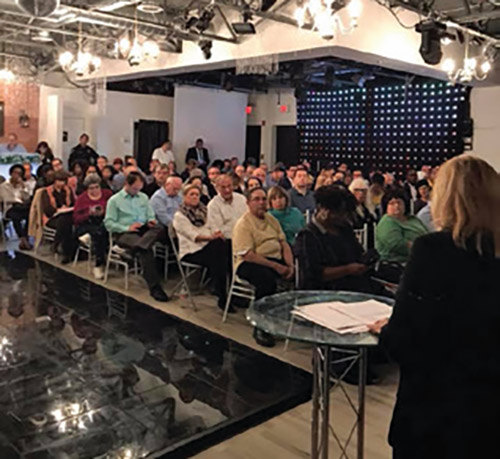

It’s been said quite a few times that hate has no place here in New Jersey, but it bore repeating last week. Thursday evening, at The Avenue event space on Queen Anne Road, Deputy Mayor Elie Katz brought together a high-level security briefing for all community members, including clergy, law enforcement, school personnel and elected officials, in light of the previous Shabbat’s tragedy in Pittsburgh.
Organized along with Teaneck Mayor Mohammed Hameeduddin and Councilman Jim Dunleavy, and sponsored by the Teaneck Chamber of Commerce and the Orthodox Union, municipal personnel, law enforcement from Teaneck and neighboring towns, and representatives from many county, state and federal agencies spoke with community members about security and preparedness. Speaking at the event to offer their unique perspectives were, among others, representatives from the New Jersey office of the FBI, Homeland Security, CSS (Community Security Service), the Teaneck Police Department, the Bergen County sheriff’s office and the Teaneck Board of Education. Local politicians also offered their perspectives and guidance.
Katz, in his introduction, placed the Pittsburgh tragedy in context of a number of recent attacks nationwide leading up to it, attacks that targeted churches and other religious organizations all over the country. “Make no mistake: An assault on any religious institution is an attack on all religious institutions,” he said.
“We need to make use of the resources that we know are available and learn about some of the resources we have access to that we may not be taking advantage of. We need to determine what should be done, and learn from each other,” said Katz.
Mayor Hameeduddin explained that the previous week had been spent coping and grappling with the frightening events, but now it was time for concrete action, noting that this isn’t the first time we have dealt with terror at houses of worship. He explained that the Kroger supermarket in Kentucky, that was the site of fatal shootings a couple of weeks ago, was not that gunman’s initial target, but he reportedly encountered a locked door at a church that made it impossible for him to carry out his first plan. While he killed two people in the supermarket, a filled church might have created a bigger death toll. “If the door wasn’t locked at the church…listen, we ask ourselves how many of us have keypads at the doors at the houses of worship and don’t use them?” he asked.
Hameeduddin encouraged hardening of all targets, with the first step making sure that the doors are used to help secure people inside, even while acknowledging that we want our doors to be open to be welcoming of others who may wish to enter peacefully.
“Each synagogue, each mosque, each church, school and day care center needs to harden its security. Call police and ask ‘how can we improve security?’ It doesn’t have to be all done by next month or end of year, but start the plan, have a meeting, get the assessment and set a timeline,” said Hameeduddin.
Congressman Josh Gottheimer (NJ-5) spoke about the importance of getting up again after having been struck down. “We have to do everything possible to prevent these things. It’s not just Jewish Americans who are being targeted; it’s people of all religions,” he said.
Gottheimer added that “what we say and what we do after such moments is essential,” and then proceeded to indicate that grants, including federation FEMA dollars, were available for houses of worship to fund guards, cameras and physical barriers for community institutions. Those funds must be applied for, and Gottheimer renewed his offer to help houses of worship apply, noting that the district had increased its FEMA security funding between 2017 and 2018 by $1.5 million.
Former Teaneck police captain and recently named Teaneck municipal manager Dean Kazinci described the steps he took in the wake of the Pittsburgh shooting, ensuring that extra patrols were dispatched and houses of worship in Teaneck were secure. “Teaneck has a municipal counterterrorism coordinator in town. We are in constant touch with our contacts at the prosecutor’s office, the sheriff’s office, state police, the joint terrorism task force, Homeland Security and various others,” Kazinci said. He also explained that a risk assessor who works at the Bergen County prosecutor’s office is available to provide free risk assessments for any stores or houses of worship, noting that situational awareness is key in most situations.
Patrick Rigby, chief of staff for the New Jersey office of homeland security and preparedness (NJOHSP), said his office’s role was to oversee all preparedness operations, cyber terrorism, on the state and local level. He noted that in a recent conversation with his office’s director, Jared Maples, Rigby’s main concern was the need to “harden our religious institutions, our sacred spaces, which are the most vulnerable to attack at this time.” He also shared that a once-small NJOHSP interfaith advisory council now, with his stewardship, has 1,900 members in 21 counties.
Assemblywoman Valerie Huttle, who also chairs the Assembly’s homeland security and preparedness committee, attended the security briefing as well, noting that safety was on everyone’s mind, for schools, nonprofits and religious institutions. She noted Attorney General Gurbir Grewal’s tracking of the increase in acts of hate, bigotry and hate-based attacks taking place in New Jersey, and registered alarm at the increasing figures.
A video of the event will be placed online soon for those who missed it, but in the meantime, anyone wishing to contact any of the offices represented at the event are invited to contact Elie Katz (katz07666@gmail.com), who will be able to provide information and additional directives.
By Elizabeth Kratz










